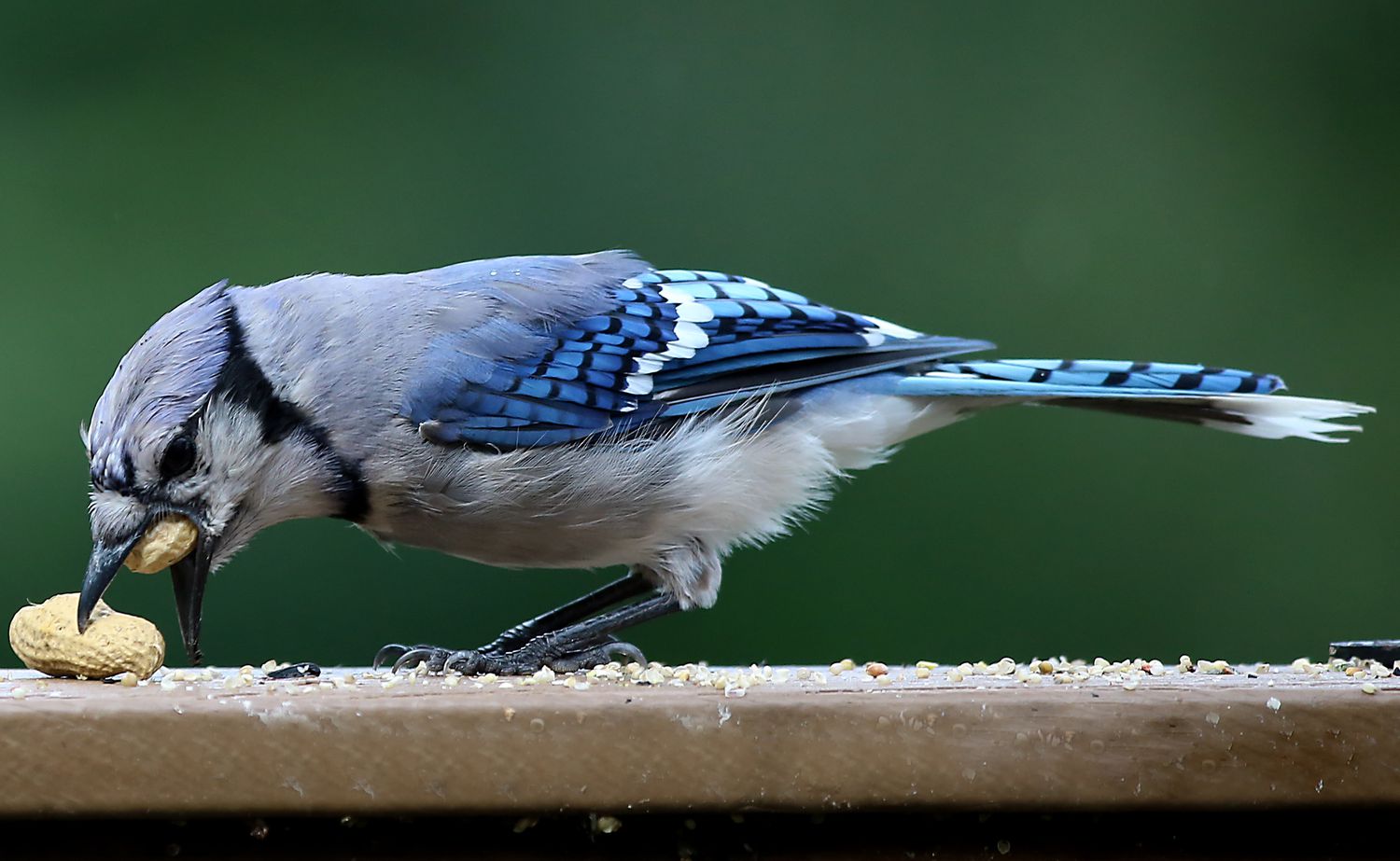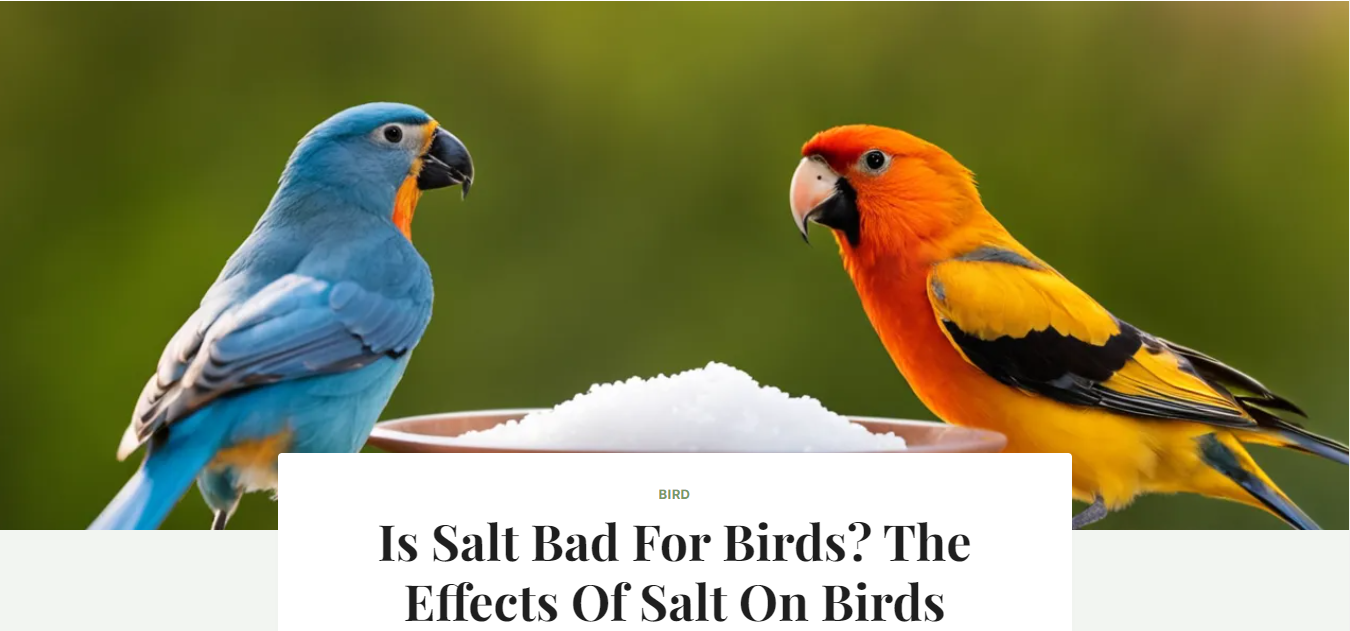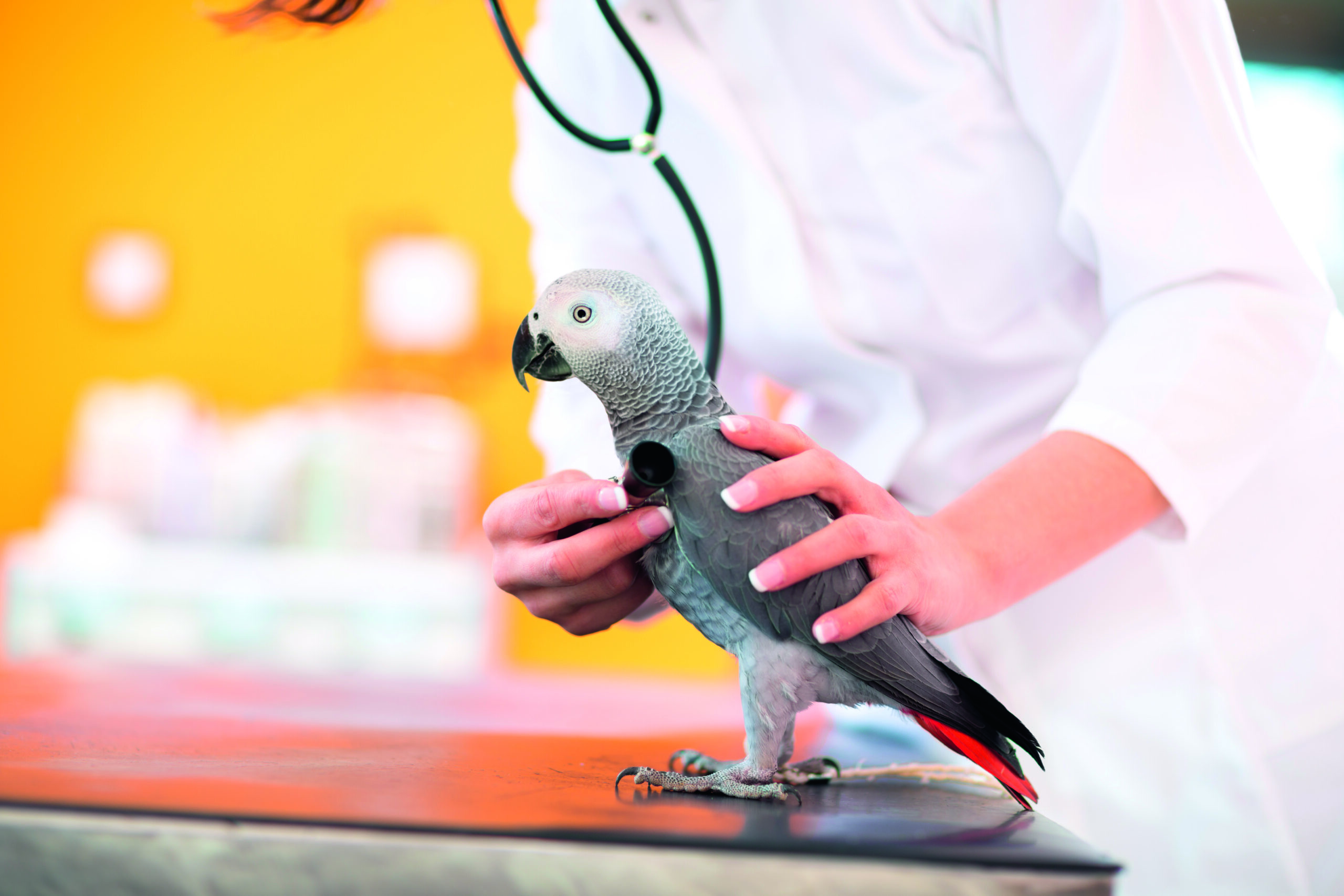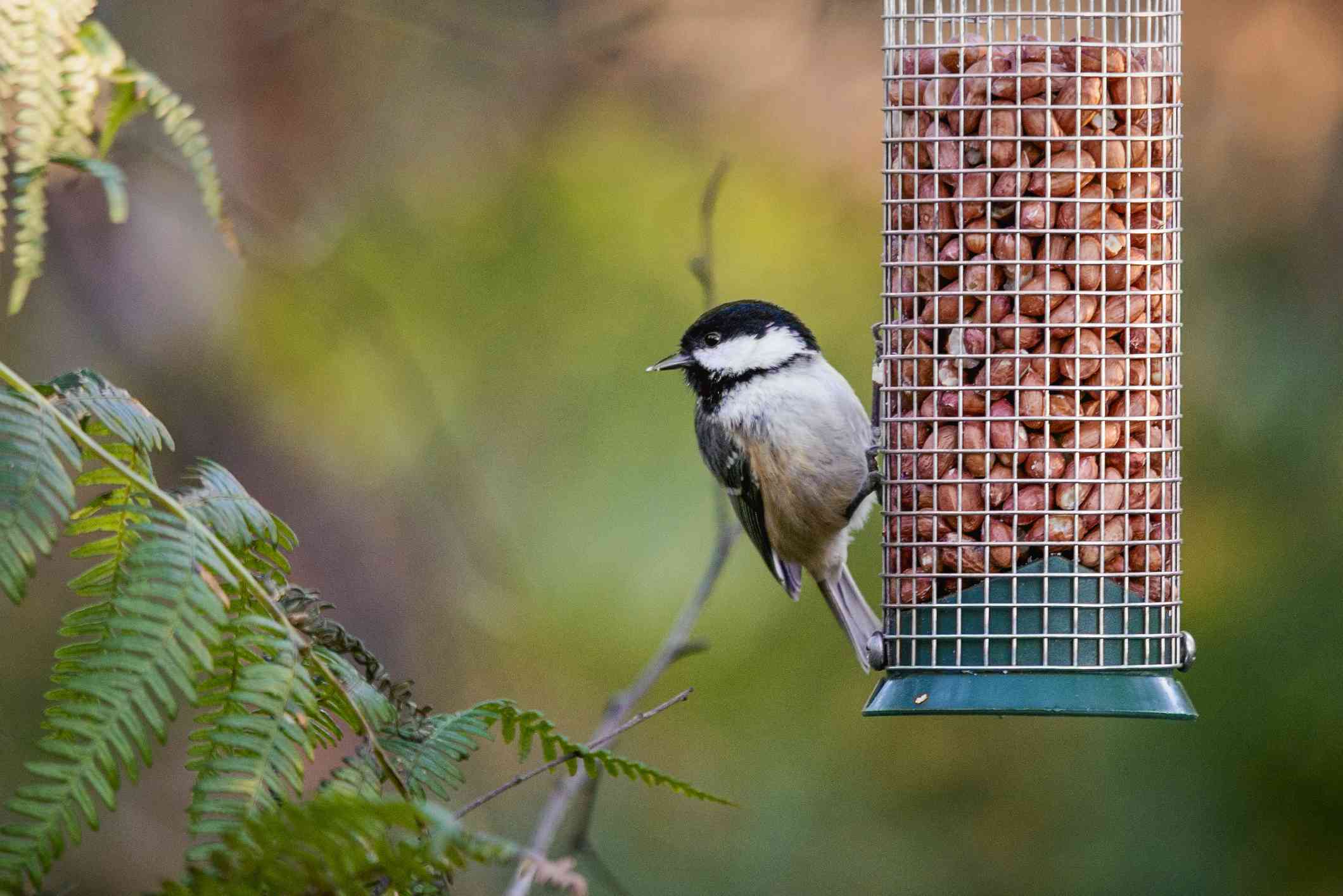Can Birds Eat Salted Peanuts? What You Need To Know
Can birds eat salted peanuts? Find out the dangers of feeding salted peanuts to birds, and safe alternatives to offer your feathered friends.
Author:Liam JonesReviewer:Maya ReyesOct 12, 20232.3K Shares399.4K Views

Can birds eat salted peanuts? No, birds should not eat salted peanuts. Birds are very sensitive to salt, and even a small amount can be harmful to them. Salted peanuts can cause dehydration, kidney problems, and even death in birds.
In addition, salted peanuts are often dry roasted, which can make them difficult for birds to digest. Birds also have a harder time than humans to remove salt from their bodies, so even if they only eat a few salted peanuts, the salt can build up in their systems over time and cause health problems.
If you want to feed birds peanuts, it is best to give them unsalted peanuts in the shell. This will allow them to remove some of the salt from the peanuts before they eat them. You can also buy peanuts that have been specifically formulated for birds. These peanuts are typically unsalted and have been processed to make them easier for birds to digest.
If you want to feed peanuts to birds, it's better to choose unsalted, raw, or roasted peanuts. This way, you can provide them with a safer and healthier snack option. Additionally, make sure the peanuts are not spoiled or moldy, as this can be harmful to birds. Always offer a variety of foods in their natural state, like fruits, seeds, and nuts, to ensure a balanced diet for the birds.
The Effects Of Salt On Bird Physiology
Excess salt in a bird's diet can have several adverse effects on their physiology,
- Dehydration -High salt intake leads to increased thirst, causing birds to drink more water. This can lead to dehydration if an adequate water source is not available.
- Kidney Damage -Birds have small kidneys relative to their size, making them more sensitive to high salt levels. Excessive salt can strain their kidneys, potentially leading to kidney damage or failure over time.
- Electrolyte Imbalance -Salt contains sodium, which is an essential electrolyte. Too much sodium can disrupt the balance of electrolytes in a bird's body, affecting nerve and muscle function.
- Reduced Reproductive Success -High salt intake can impact a bird's reproductive system. It may lead to reduced egg production and compromised eggshell quality, affecting the overall reproductive success of the bird population.
- Impaired Feather Health -Excess salt can interfere with the normal growth and health of feathers. This can lead to issues with insulation, flight, and overall mobility.
- Digestive Problems -Too much salt can lead to gastrointestinal issues, including irritation of the digestive tract and potentially ulcers.
- Weakened Immune System -High salt intake may weaken a bird's immune system, making them more susceptible to illnesses and infections.
- Behavioral Changes -Birds may exhibit changes in behavior if they consume too much salt. They might become lethargic or show signs of discomfort.
- Reduced Lifespan -Prolonged exposure to high salt levels can lead to chronic health issues, potentially shortening a bird's lifespan.
Given these potential risks, it's important to provide birds with a diet that is low in salt. If you wish to feed birds, it's recommended to offer them natural, unsalted foods like fruits, seeds, and nuts in moderation. Additionally, providing a fresh and clean water source is crucial to help them balance their electrolytes and stay properly hydrated.
Here are some additional points to consider,
- Migration Disruption -Birds that consume excessive salt may experience disruptions in their migratory patterns. This can be detrimental to their overall survival, as successful migration is crucial for many bird species.
- Reproductive Abnormalities -High salt levels can lead to reproductive abnormalities, including reduced fertility and hatching success. This can have long-term implications for the population dynamics of bird species.
- Altered Feeding Behavior -Birds may alter their feeding behavior in response to a high-salt diet. They may avoid certain food sources, potentially leading to a less diverse and nutritious diet.
- Impact on Surrounding Ecosystem -Birds play vital roles in ecosystems, such as pollination and seed dispersal. If their health is compromised due to excessive salt intake, it can have cascading effects on the surrounding environment.
- Vulnerability to Predators -Weakened or sick birds are more vulnerable to predation. High salt levels can contribute to their overall vulnerability, as they may be less alert or agile.
- Increased Susceptibility to Disease -Birds with compromised health due to excess salt intake may be more susceptible to various diseases. This can further impact their overall well-being and survival.
It's crucial to be mindful of the potential harm that salted foods can cause to birds. Providing them with a balanced, natural diet and a clean source of water is the best way to support their health and well-being. If you want to offer treats to birds, opt for unsalted, bird-friendly options like fresh fruits, unsalted nuts, and seeds. This way, you can enjoy watching these feathered friends without causing harm to their health.
How To Identify Signs Of Salt Poisoning In Birds
Identifying signs of salt poisoning in birds is crucial for their well-being. Here are some key indicators to look for,
- Excessive Thirst and Drinking -Birds suffering from salt poisoning will often display increased thirst. They may be observed drinking water frequently or in larger quantities than usual.
- Changes in Behavior -Watch for alterations in normal behavior. This can include lethargy, listlessness, or a general lack of energy. Birds may appear less active and alert.
- Disorientation or Confusion -Salt poisoning can affect a bird's nervous system, leading to disorientation or a lack of coordination in movements.
- Loss of Appetite -Birds experiencing salt toxicity may show a reduced interest in food. They may pick at their food or avoid it altogether.
- Vomiting or Regurgitation -Excessive salt intake can irritate a bird's digestive system, leading to vomiting or regurgitation. This may be observed as the bird expelling undigested food.
- Tremors or Shaking -Neurological symptoms like tremors or shaking can be indicative of salt poisoning. These involuntary movements may affect various parts of the bird's body.
- Seizures -In severe cases, salt poisoning can lead to seizures. These are characterized by uncontrolled, convulsive movements and may be a sign of advanced toxicity.
- Excessive Urination -High salt levels in a bird's system can lead to increased urination. Keep an eye out for wet or soiled feathers around the cloaca (vent) area.
- Difficulty Breathing -In some cases, birds may exhibit labored breathing or respiratory distress due to the impact of salt on their physiological functions.
- Abnormal Plumage or Feather Condition -Salt poisoning can affect the health and appearance of a bird's feathers. Look for signs of poor feather condition, such as dullness, breakage, or abnormalities in feather growth.
- Weight Loss -Chronic salt poisoning can lead to weight loss over time, as it may disrupt the bird's ability to absorb essential nutrients.
If you suspect a bird may be suffering from salt poisoning, it's important to seek immediate veterinary care. Providing fresh, clean water and removing any sources of salted food can also help mitigate further harm. Preventing access to salted foods in the first place is the best way to avoid this issue altogether.
Here are some additional points to consider,
- Visible Discomfort or Distress -Birds experiencing salt poisoning may exhibit signs of discomfort. This can include hunching over, fluffing up their feathers, or displaying other body language indicating distress.
- Changes in Vocalizations -Listen for alterations in a bird's usual vocalizations. They may become quieter, more subdued, or produce unusual sounds due to their discomfort.
- Pale or Discolored Skin and Beak -In severe cases of salt poisoning, a bird's skin and beak may take on an abnormal coloration, such as paleness or a reddish tint.
- Loss of Balance or Coordination -Birds affected by salt toxicity may have difficulty maintaining balance. They may wobble or fall over when attempting to perch or move around.
- Lack of Response to Stimuli -Salt poisoning can lead to a decreased responsiveness to external stimuli. The bird may not react as expected when approached or handled.
- Elevated Heart Rate -An accelerated heart rate may be noticeable in birds suffering from salt poisoning. This can often be observed by careful monitoring of their chest area.
- Frequent Preening or Scratching -Birds may engage in excessive preening or scratching behaviors, potentially in an attempt to alleviate discomfort caused by salt poisoning.
- Swelling or Bloating -In severe cases, salt poisoning may lead to fluid retention and swelling, particularly in areas such as the legs or abdomen.
- Loss of Consciousness -In extreme cases, a bird may lose consciousness or become unresponsive. This is a critical emergency situation requiring immediate attention.
If you observe any of these signs in a bird, it's essential to take prompt action. Contact a wildlife rehabilitator, avian veterinarian, or local animal rescue organization for advice and assistance. Providing a safe and supportive environment, free from sources of excessive salt, is crucial for the bird's recovery. Remember, early intervention is key to maximizing the chances of a positive outcome for the affected bird.
What To Do If You Think Your Bird Has Eaten Salted Peanuts
If you suspect that your bird has consumed salted peanuts, it's important to take immediate action. Here's what you should do,
- Remove Access to Salted Peanuts -Ensure that no more salted peanuts are accessible to your bird. Remove any remaining peanuts from their environment.
- Provide Fresh Water -Offer your bird access to clean, fresh water. This will help dilute the effects of the excess salt and promote hydration.
- Observe Closely -Monitor your bird closely for any signs of salt poisoning, as discussed earlier. Pay attention to changes in behavior, appearance, and overall condition.
- Contact a Veterinarian -If you notice any concerning symptoms or if you know that your bird has consumed a substantial amount of salt, it's crucial to contact an avian veterinarian or an emergency veterinary clinic immediately. They can provide guidance on the next steps to take.
- Do Not Attempt DIY Treatments -Avoid trying to treat the bird yourself without professional guidance. Administering incorrect treatments or home remedies can potentially worsen the situation.
- Keep the Bird Calm -Ensure that your bird is in a quiet, stress-free environment. Limit handling to prevent additional stress.
- Prepare Information for the Veterinarian -Have details ready about the type and amount of salted peanuts consumed, as well as any observed symptoms. This information will be important for the veterinarian's assessment.
- Transport Safely -If the veterinarian advises you to bring the bird in for treatment, transport them in a secure, well-ventilated carrier. Avoid sudden movements or loud noises during transport.
- Follow Veterinary Recommendations -Once at the vet, follow their recommendations for treatment. This may include fluid therapy, monitoring, and other supportive care measures.
- Prevent Future Incidents -To prevent future incidents, ensure that your bird's environment is free from harmful substances like salted peanuts. Stick to a diet of bird-friendly, unsalted foods.
Remember that time is of the essence when dealing with potential emergencies like salt poisoning. Early intervention can greatly improve the chances of a positive outcome for your bird. Always consult with a professional for the best course of action.
Here are some additional points to consider,
- Maintain a Record -Keep a record of any changes in your bird's condition and behavior. This can be valuable information for the veterinarian and can help track the progress of their recovery.
- Follow Aftercare Instructions -If your bird receives treatment from the veterinarian, be sure to follow any aftercare instructions provided. This may include medications, dietary adjustments, or special care requirements.
- Provide a Comfortable Recovery Environment -Ensure that your bird's cage or enclosure is set up in a way that promotes comfort and minimizes stress. Offer soft bedding, appropriate perches, and a quiet environment.
- Continue to Monitor -Keep a close eye on your bird's progress during their recovery. Look for signs of improvement or any new symptoms that may arise.
- Consult for Dietary Changes -If your bird's diet was a contributing factor, consult with a veterinarian or avian nutritionist to create a balanced and bird-safe feeding plan. This will help prevent similar incidents in the future.
- Stay Informed and Educated -Familiarize yourself with safe and appropriate foods for your bird's diet. Avoid offering items that are high in salt or harmful to their health.
- Prevent Access to Harmful Substances -Take precautions to ensure that your bird cannot access potentially harmful substances. This includes not only foods but also household items, plants, and chemicals.
- Regular Veterinary Check-ups -Schedule regular check-ups with an avian veterinarian to monitor your bird's health and catch any potential issues early.
- Learn First Aid for Birds -Familiarize yourself with basic first aid procedures for birds, including how to administer fluids and handle emergencies. This knowledge can be invaluable in times of need.
- Stay Calm and Be Patient -Remaining calm and collected is important for both you and your bird. Patience and a steady approach to their care will contribute to a smoother recovery.
Remember, every bird is unique, and individual circumstances may vary. Always consult with a professional for the most accurate and specific advice for your bird's situation. Your dedication to their well-being is crucial in helping them recover and thrive.
Safe Alternatives To Salted Peanuts For Birds
There are many safe and nutritious alternatives to salted peanuts that you can offer to birds. Here are some bird-friendly options,
- Unsalted Raw Peanuts -Raw, unsalted peanuts are a great source of protein, healthy fats, and essential nutrients for birds. They provide a natural and nutritious snack option.
- Unsalted Roasted Peanuts -If you prefer to offer roasted peanuts, make sure they are unsalted. Roasted peanuts can be easier for some birds to digest and still provide valuable nutrients.
- Sunflower Seeds -Sunflower seeds are a popular and nutritious treat for many bird species. They are rich in healthy fats, protein, and essential vitamins.
- Nuts -Almonds, walnuts, and pecans (unsalted and raw) are good options for birds. These nuts are high in healthy fats and provide a good source of energy.
- Fruits -Fresh fruits like apples, berries, grapes, and melons are excellent choices for birds. They provide essential vitamins, minerals, and hydration.
- Berries -Blueberries, strawberries, and raspberries are high in antioxidants and are a favorite among many bird species.
- Bananas -Birds can enjoy small pieces of banana as a tasty and nutritious treat. Bananas are a good source of potassium and other essential nutrients.
- Vegetables -Offer a variety of fresh vegetables like carrots, peas, corn, and spinach. These provide essential nutrients and can be a fun addition to a bird's diet.
- Cooked Rice or Pasta -Plain, cooked rice or pasta can be a good source of carbohydrates for birds. Make sure not to add any seasonings or sauces.
- Unsweetened Cereal -Some birds may enjoy unsweetened, whole-grain cereals like oats or bran flakes. These can be a good source of fiber and energy.
- Mealworms -Mealworms are high in protein and are a favorite among insect-eating birds like bluebirds, robins, and chickadees.
- Suet -Suet is a high-energy food made from animal fat. It's especially beneficial for birds during colder months when they need extra calories to stay warm.
Remember to provide a balanced diet that includes a variety of foods. Additionally, always ensure that the foods offered are fresh and free from any signs of spoilage or mold. Providing a clean and accessible water source is also crucial to keep your feathered friends properly hydrated.
Here are some more safe alternatives for feeding birds,
- Pumpkin Seeds -These seeds are a good source of protein and essential nutrients. Birds like finches and sparrows often enjoy them.
- Uncooked Oats -Rolled or steel-cut oats are a nutritious option for many bird species. They are rich in fiber and can be served dry or mixed with a little water.
- Dried Fruits -Unsweetened, dried fruits like raisins, currants, and apricots can be offered in small amounts. They provide natural sugars and essential nutrients.
- Cheerios or Plain Oat Cereals -These low-sugar, whole-grain cereals are safe for birds and can be a good source of carbohydrates.
- Chopped Greens -Offer fresh, leafy greens like kale, spinach, or lettuce. These provide important vitamins and minerals for a bird's diet.
- Hard-Boiled Eggs -Finely chopped, hard-boiled eggs are a great source of protein for birds. They are especially beneficial during nesting and breeding seasons.
- Cracked Corn -This is a common treat for many ground-feeding birds like ducks, quail, and doves. It's a good source of carbohydrates.
- Unsalted Popcorn -Plain, air-popped popcorn is a fun and low-fat treat for birds. Avoid using any butter, salt, or seasonings.
- Quinoa -This high-protein grain can be cooked and offered to birds. It's a good source of amino acids and essential nutrients.
- Natural, Unsalted Nut Butter -Peanut, almond, or cashew butter (without added salt or sugar) can be spread on logs or offered in suet feeders for birds to enjoy.
- Herbs -Some birds may benefit from a variety of fresh herbs like parsley, basil, or cilantro, which can provide additional nutrients.
- Cabbage or Kale Leaves -These can be hung or attached to a feeder for birds to peck at. They provide entertainment and a source of nutrition.
- Dandelion Greens -These common weeds are actually highly nutritious for birds and are rich in vitamins and minerals.
Remember to offer treats in moderation and as part of a balanced diet. Each bird species has specific dietary preferences and needs, so it's a good idea to research the preferences of the birds in your area. Providing a variety of foods will help attract a diverse range of bird species to your feeding area.
Tips For Feeding Birds Peanuts Safely
Feeding birds peanuts can be a delightful way to attract a variety of bird species to your yard or garden. However, it's crucial to do so safely to ensure the well-being of the birds. Here are some tips for feeding birds peanuts safely,
- Use Unsalted, Unflavored Peanuts -Choose unsalted, raw or roasted peanuts. Avoid any peanuts that are flavored or coated with seasonings, as these may contain harmful additives.
- Ensure Peanuts are Fresh and Clean -Inspect the peanuts for signs of spoilage or mold before offering them to birds. Discard any peanuts that appear discolored or have an unusual odor.
- Provide Whole Peanuts or Chopped in Small Pieces -Birds can handle whole peanuts, but chopping them into smaller pieces can make it easier for smaller bird species to feed.
- Offer Peanuts in Moderation -Peanuts are high in fat and protein, which can be beneficial for birds, but they should be part of a balanced diet. Avoid over-reliance on peanuts and offer a variety of other bird-friendly foods.
- Use Appropriate Feeders -Use feeders designed for peanuts to prevent spillage and keep the feeding area clean. Mesh feeders or peanut wreaths are good options for offering peanuts.
- Keep Peanuts Dry -Wet or damp peanuts can become moldy and pose a health risk to birds. Ensure that the peanuts and the feeder remain dry.
- Rotate Stock -If you regularly feed birds peanuts, make sure to rotate your stock to ensure freshness. Store them in a cool, dry place to maintain their quality.
- Avoid Feeding Whole Peanuts in Shell -Birds can have difficulty opening peanut shells, and there is a risk of injury. Provide shelled peanuts to make it easier for them to access the nut.
- Monitor Bird Behavior -Pay attention to the behavior of the birds that visit your feeding area. If you notice any signs of distress or illness, stop offering peanuts and consult a wildlife expert or veterinarian.
- Maintain a Clean Feeding Area -Regularly clean the feeder and the surrounding area to prevent the buildup of debris, which can attract pests and bacteria.
- Offer a Variety of Foods -In addition to peanuts, provide a diverse selection of bird-friendly foods like seeds, fruits, and suet. This ensures that birds receive a balanced and nutritious diet.
- Avoid Feeding Birds with Moldy Peanuts -Moldy peanuts can be toxic to birds. If you encounter any moldy nuts, discard them immediately.
By following these tips, you can enjoy the pleasure of feeding birds peanuts while prioritizing their health and well-being. Remember to be patient, as it may take some time for birds to discover and trust the new food source.
(Can Birds Eat Salted Peanuts) _____ FAQs
Are Salted Peanuts OK For Parrots?
But if you do, feed them only a very small amount. Peanuts are very high in fat and should *only* be used as treats or rewards. And don't feed them peanuts that are roasted or salted. Roasted peanuts are either dipped in salt or oil, which is no good for birds.
Can Birds Eat Raw Rice?
If birds eat uncooked rice, can it swell up in their throats and stomachs and kill them? Lots of birds eat uncooked rice in the wild. Bobolinks, sometimes called rice birds, are a good example. While rice is okay for birds, many wedding parties now throw birdseed instead.
Can Birds Eat Oats?
Yes, birds can eat raw porridge oats. Oats are a very nutritious grain and good for birds in moderation, especially in the winter months. Many birds enjoy oats, especially blackbirds. Never served cooked oats as they are sticky and may glue a birds beak closed as they dry.
Conclusion
Can birds eat salted peanuts? No, salted peanuts are harmful to birds and should not be fed to them. Salt can cause dehydration, kidney damage, hypertension, and salt poisoning in birds. If you think your bird has eaten salted peanuts, monitor them closely for signs of salt poisoning and take them to a veterinarian if necessary. Safe alternatives to salted peanuts for birds include unsalted peanuts in the shell, birdseed, fruit, vegetables, and insects.
Share this article with other bird lovers to help them learn about the dangers of feeding salted peanuts to birds. Sign up for our newsletter to receive more tips on bird health and food. Visit our website to learn more about our products and services for bird lovers.

Liam Jones
Author
Liam Jones has made it his mission to prove that adventure doesn’t need a hefty budget. Having traveled to over 40 countries, he specializes in finding affordable ways to experience the world, from the best street food in Bangkok to hidden gems in Lisbon.
Liam’s travel tips have reached thousands of readers, empowering them to see the world on a shoestring budget without sacrificing quality. With a deep passion for local cultures, he continues to share his travel hacks, ensuring adventure remains accessible to all.

Maya Reyes
Reviewer
Maya Reyes’s wanderlust was sparked in the temples of Luang Prabang, where the scent of lemongrass and the chants of monks revealed the transformative power of travel.
Since then, her journey has been defined by cultural immersion and authentic connections. From learning batik in Indonesia to sharing meals with nomadic families in Mongolia, Maya seeks experiences that highlight the human stories behind each destination.
Travel for her is a way to weave her narrative into the world’s cultural tapestry, creating bridges across diverse ways of life. Maya has traveled to 15 countries and shares her insights through writing and storytelling.
Latest Articles
Popular Articles


